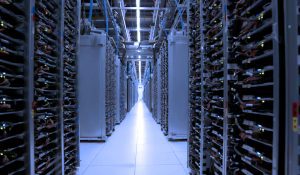At the Innovation Summit event Schneider Electric recently hosted in Barcelona, attendees had the opportunity to hear two giants in the data center industry – Google and the colocation provider Equinix – talk about the challenges they’re facing in digitizing their data centers. What struck me about the conversation was how similar their challenges are to virtually any colocation company or enterprise that operates data centers of any size.
I had three big takeaways from the session. The first was how these companies rely on data and machine learning (ML) algorithms to improve data center operations, such as with predictive maintenance. Second was the importance of standardization in data centers, and how it is actually a prerequisite of innovation. And the third is how both companies are dealing with the shortage of people with expertise in designing control systems and operating mission critical data centers.
Data Drives Efficient, Predictive Maintenance
As data centers continue to grow vastly in scale and complexity, more companies have to turn to digital management to optimize performance. Joe Kava, Vice President, Global Data Centers for Google, talked about how his company had already instrumented just about everything in its data centers and for years was collecting vast amounts of data. But it wasn’t using the data very much until an engineer came up with the idea of developing an ML model and training it on the data, for two main reasons: to improve energy efficiency and predict when a piece of equipment was going to fail.
A few years later, almost 100% of Google’s facilities are using ML to optimize the cooling plant, under fully autonomous operations. (That reminded me of a blog post my colleague John Niemann wrote a couple years ago that described a similar capability).
Clearly, few companies have the resources Google has and can go and build their own ML models good enough to enable a data center to essentially run itself. But, the industry has progressed to the point where you don’t have to, because tools exist to help any company do essentially the same thing.
The critical thing is that the tools be “open,” meaning they can work with infrastructure from any vendor. Schneider Electric EcoStruxure for Cloud & Service Providers is one such platform. It delivers the same sort of data analysis that Google developed on its own, giving companies of any size access to advanced analytics to drive greater data center efficiency and capabilities such as predictive analytics.
Standardization Promotes Innovation
Both companies are also big proponents of standardization because of the flexibility it provides them to expand capacity quickly. For Equinix, which operates some 200 data centers on five continents, standardization is critical, said Diraj Bamola, SVP Global Design and Construction for the company.
Equinix deliberately sought to put in a structured design and construction framework for its control systems and power distribution units, with Schneider Electric as a partner, Bamola said.
Schneider Electric, of course, has long been a proponent of standardization. It’s at the core of the prefabricated, modular data center infrastructure that we’ve been promoting for some time as a way to build data centers more quickly while maintaining sound reliability and performance.
But standardization is also important because it drives innovation by acting as a baseline that you can improve against, Bamola noted. Companies like Google and Equinix have no choice but to innovate in order to keep up with rapid growth. The good news is the innovations they come up with, often with our help, eventually trickle down and become available in the general market.
The Open Compute Project is one example. It started with innovations Facebook developed while trying to build a data center with new levels of energy efficiency and performance, at low cost. Now OCP has designs for servers, racks, network equipment and more that are freely available to all.
Standardization is also important when it comes to training data center operations personnel, Kava noted. If each site had different designs and operations processes, “it’d be a mess” trying to train staff to operate at a mission critical level of availability, he said.
Data Center Expertise at a Premium
Which brings me to the final point, the shortage of data center expertise.
Asked where he sees some of the biggest data center talent gaps, Bamola pointed to the back of the room where a Schneider Electric engineer, Julien Moreau was standing. “Julien is a leader in the industry and knowledgeable of engineering and distribution.” he said. “This is a massive pain point. We probably all have large build projects that are completely dependent on a finite few of these precious resources.”
That pain point has to do with keeping up with the massive growth in the data center industry. While 10 years ago data centers may have been 5MW in size, and 20MW just 5 years ago, now we see data centers of 100MW or more. Such data centers are really the equivalent of a massive manufacturing plant, and the controls required to deal with the required mechanical, electrical, cooling and other infrastructure are extremely complex.
It requires industrial-grade controls, and that’s what engineers like Julien help to deliver. But Bamola is right that engineers with his level of expertise are rare. Even Google struggles to find qualified personnel to staff its data centers, Kava said.
The data center talent shortage makes it all the more imperative that companies employ tools like EcoStruxure for Cloud & Service Providers. Its cloud-based analysis engines can make data center personnel more productive by helping them troubleshoot issues and avoid problems in the first place with predictive maintenance applications. In essence, EcoStruxure for Cloud & Service Providers makes the kind of data center operations expertise that Google and Equinix have available to any company.
Watch Google’s and Equinix’s Innovation Summit Session
Those were my three takeaways from the expert learning session with Google and Equinix, but feel free to watch the full conversation, led by Mark Bidinger President of Cloud & Service Providers segment at Schneider Electric. You may be able to pick up other lessons from these data center giants that can benefit your own business.



